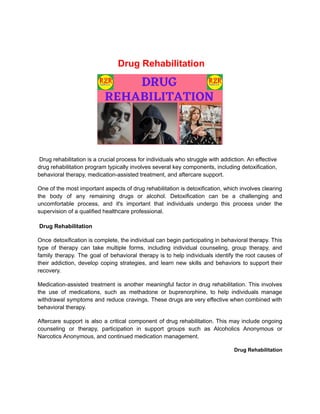More About Drug Rehabilitation
More About Drug Rehabilitation
Blog Article
The Buzz on Drug Rehabilitation
Table of ContentsThe Basic Principles Of Drug Rehabilitation Not known Factual Statements About Drug Rehabilitation Some Known Facts About Drug Rehabilitation.Get This Report about Drug RehabilitationThe 8-Second Trick For Drug Rehabilitation
This includes attending to the entire individual to ensure that all of the underlying domino effects of the dependency are appropriately cared for and remedied. This offers people the tools they require for a complete return to a happy, healthy and balanced, substance-free life. Drug dependency "therapy" is a little bit of a deceptive term it indicates that individuals with addictions are "all much better" after they have gotten some type of therapy.Also people with years of effective healing should stay conscious of their capacity for regression, and they must use the devices they found out in therapy to stop it. The word "rehabilitation" likewise implies that someone is being remedied after misbehaving, which follows society's preconception regarding dependency. Drug Rehabilitation. Part of the healing process is for people with addictions, and their families, to find out that dependency refers biology and not principles
Nevertheless, transitioning from physical and psychological addiction to a healthy and delighted lifestyle is a big adjustment. It is essential that the actions to medicine recovery be effectively resolved during the drug rehab procedure. There are 4 stages of addiction recuperation: Addiction assessment is a specifically important part of the rehabilitation process.
This is component of the underlying psychology of dependency, and it enhanced by worries of arrest for ownership and judgment from friends and family. The analysis procedure calls for gaining depend on and breaking via that secretive nature. The private requirements to determine which materials were utilized and the degree of their material use.
More About Drug Rehabilitation

For numerous people with addictions, fear of withdrawal is a major barrier to leaving their addiction, and that concern keeps them from also trying. Withdrawal and drug detoxification do not have to be a terrible experience.
This is where the underlying root causes of dependency are attended to. For most individuals with substance dependency, their compound usage is no more about obtaining high. Rather, it came to be a repeated, daily procedure of avoiding withdrawal signs and leaving from their fact. Medication rehabilitation is the process where the deep concerns around the addiction are identified and addressed.
The Ultimate Guide To Drug Rehabilitation
Instead, it can be said that rehab is the procedure of exploration, while what happens afterward is recovery. The addicted mind often begins to believe particularly after a time period in abstaining that it is alright to try drinking or making use of compounds once again. This seldom works, and the vast majority of individuals who try alcohol consumption or making use of drugs again will promptly finish up read this post here where they were before.

Sober living homes are an especially reliable strategy to aftercare when a person is from this source discharged from rehab. People and their families need to review these alternatives with their counselors while still in rehab. There are various kinds of treatment for addiction, based on the degree of treatment provided. When choosing the level of therapy, the choice ought to be based upon what will supply the private the very best opportunity of success in recuperation not on what the individual desires to do.
This is a negative combination, as it moves many individuals to believe that they can quit utilizing medicines or drinking on their own. As such, they may hesitate to see and confess that they require a higher level of treatment, such as inpatient rehabilitation. Detoxing from a compound is not the same as treatment for material dependency.
The Ultimate Guide To Drug Rehabilitation
Throughout the process of medication detoxification, people's minds are jumbled and they really feel physically and psychologically unwell. They are not receptive to any type of type of therapy or therapy up until their minds clear and they are feeling much better. Despite the fact that medical detoxification makes the procedure a lot easier, it is best to very first focus on making it through the entire detox procedure before taking additional steps.
Like inpatient treatment, household therapy provides the therapeutic result of eliminating get redirected here individuals from their dysfunctional lifestyle and setting and placing them in risk-free, healthy environments. This allows them to reorient their lives and thought procedures while concentrating on distraction-free healing.
People receive therapeutic solutions on-site throughout the day, but go home or to a sober living center at evening. The strength of the daytime treatment will depend on individual requirements and the programs available at the outpatient facility. The majority of individuals with severe addiction will likely have better outcomes in inpatient treatment and rehabilitation.
Some Of Drug Rehabilitation
Lasting domestic therapy programs typically utilize a restorative strategy called the restorative area (TC). This is an approach to re-socializing people whose addiction has seriously affected their ability to suit culture. These consist of people with significant criminal actions, individuals that are homeless, teenagers and people with significant psychological health and wellness conditions.
Report this page